 Written by Steve Gandara
Written by Steve Gandara
FORGET THE NEW NORMAL – IT’S TOO SLOW!
 Too much has already changed, too fast to waste any of your valuable time even considering using the word normal, let alone considering going back to the way things were before the global pandemic. That will never take place. Too much has already changed to ever return to the way things were. If you read our last article you’ve already realized that not only is there not going to be a “New Normal,” just focusing on the word NORMAL slows you down and debilitates your team keeping you from achieving the level of Excellence that the New Reality demands.
Too much has already changed, too fast to waste any of your valuable time even considering using the word normal, let alone considering going back to the way things were before the global pandemic. That will never take place. Too much has already changed to ever return to the way things were. If you read our last article you’ve already realized that not only is there not going to be a “New Normal,” just focusing on the word NORMAL slows you down and debilitates your team keeping you from achieving the level of Excellence that the New Reality demands.
WHICH COLUMN DO YOU AND YOUR TEAM FALL INTO?
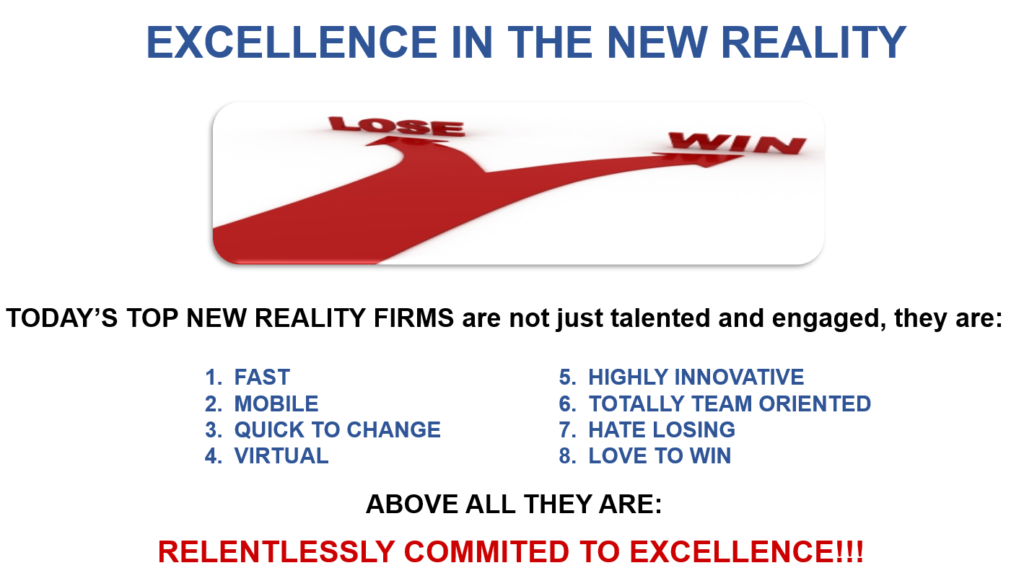
Are you in the Excellent New Reality column with a culture that’s:
- Fast
- Mobile
- Quick to Change
- Virtual
- Highly Innovative
- Totally Team Oriented
- Hate Losing
- Love to Win
- RELENTLESSLY COMITTED TO EXCELLENCE?
Or are you:
- Still Waiting for Things to Get Back to Normal
- Waiting for The New Normal to Arrive
- Paralyzed with the Fear of Survival
- Fear of What the Future Might Bring
- Still Trying to Figure out What to do Differently to Survive and Thrive in the New Reality that is Changing Every Single Day
- Frozen in your steps still wondering what happened and what to do?
I hope you are at least someplace in between the two of these and not stuck in the second column.
THE DIFFERENCE BETWEEN SURVIVORS AND THRIVERS
In the last two weeks, I have spoken to numerous CEOs and senior executives from small businesses, mid-market firms, nonprofit ministries, and Fortune 500 Global Firms. Given their abundance of resources, one would think that the largest and most successful firms would have the best, most well-thought-out go forward post-pandemic plans. You would be amazed that in most cases, it’s just the reverse. Because the big guys are so big, most of them are still cutting every cost they can possibly cut just to get to a place of neutral so that they can start developing a go forward “New Reality” strategy.
There is one thing that I have heard several times that seems to be consistent across the board. The firms who previously had the Fast, Mobile, Quick to Change, Virtual first column corporate cultures made changes in the first few weeks of the pandemic. As a result, they are already thriving in the new reality that is unfolding and changing every single day. Costco, Peloton, Walmart, Wayfair, Trader Joe’s, Amazon, Microsoft, Netflix, Overstock, Facebook, Slack and Zoom, all began to thrive in the first few weeks. Pizza Chains: Papa John’s, Domino’s, Pizza Hut et al have announced plans to add nearly 100,000 new workers. Amazon is adding 100,000 full and part time workers. Costco similarly. Walmart 150,000 new associates. Others are thriving as well.
On the other hand, we have established retail brands like J.C. Penny, J. Crew, and Nieman Marcus filing for bankruptcy and Nordstrom closing 16 stores in 9 states. While some of the decrease is certainly industry related, most were already wavering when the virus threw the knockout punch. Why?
I was chatting with a couple execs from a well-known Fortune 10 in a different industry this past week regarding their expectations. These guys were convinced that when the numbers come in differentiating costs between their now virtual workforces versus the high costs of office space and real estate for large, elaborate corporate headquarters facilities, things are absolutely going to change again. Organizations with large head counts who have thrived in large beautiful headquarters facilities for generations are now rethinking their strategies all because of the Covid-19 crisis forcing virtual workplace cultures to begin to emerge in places where they were never considered before.
How would you like to be in the commercial office space business these days? One B-to-B CEO shared his conversations with several of his client CEOs this past week regarding the number of businesses refusing to pay their office rent because funds were tight and they didn’t justify paying an unnecessary, unused expense during a survival mode as essential. Why?
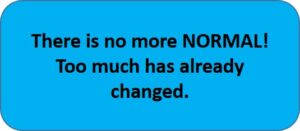 If your answer to the why question is Covid-19, you are both partially right and totally stuck. If you believe that “there is one day going to be a new normal” and your team’s conversations are along the same lines, you are due to be stuck for a while. There is no more NORMAL! Too much has already changed and continues to change daily for there ever to be another “normal.” Unless the new normal is continuous, ongoing, consistent never-ending change followed by more change which defies the definition of the word normal.
If your answer to the why question is Covid-19, you are both partially right and totally stuck. If you believe that “there is one day going to be a new normal” and your team’s conversations are along the same lines, you are due to be stuck for a while. There is no more NORMAL! Too much has already changed and continues to change daily for there ever to be another “normal.” Unless the new normal is continuous, ongoing, consistent never-ending change followed by more change which defies the definition of the word normal.
Let’s pause for a moment and consider Merriam Webster’s first two definitions for the word “Normal:”
- conforming to a type, standard, or regular pattern
- according with, constituting, or not deviating from a norm, rule, or principle
Ha! So, what does a “normal” workday look like these days? What about “normal” working hours? What about a “normal” routine? “Normal” ways to serve clients? “Normal” business hours? “Normal” office location? A “normal” life?
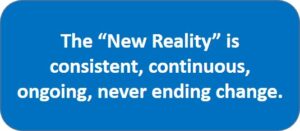 The “New Reality” is consistent, continuous, ongoing, never ending change.
The “New Reality” is consistent, continuous, ongoing, never ending change.
- If you’re still trying to figure this out, you’re stuck!
- If you’re still in a cost cutting survival lock down mode, you’re stuck!
- If you’re waiting for things to settle down, you’re stuck!
- Most of all, if you or your team are still even considering the word “NORMAL,” then you’re really stuck!
WHAT CAN WE LEARN FROM THE THRIVERS?
When we considered the industry diverse group of thrivers earlier we mentioned Costco, Peloton, Walmart, Wayfair, Trader Joe’s, Amazon, Microsoft, Netflix, Overstock, Facebook, Slack and Zoom and the Pizza guys. Some of the thrivers that I omitted from the list, just had a product that the dynamics of the virus skyrocketed like Clorox and Lysol. Others, that are extremely industry diverse, had an incredibly unique common denominator that was in existence before the virus was a factor. What was it?
Of course, it was their Corporate Cultures! I know, we’ve all been told time and time again that “culture trumps strategy,” “culture eats strategy for breakfast,” “culture isn’t everything, it’s the only thing” and so many cute, punchy, valuable corporate culture truisms time and time again and again. Yet, today we’re talking about a very unique type of corporate culture. We are talking about the type of corporate culture that thrives in a rapidly changing environment driven by a global pandemic. What type of culture is that?
Before we go there, let us make sure we are all talking about the same thing. In four decades helping organizations from startups to Fortune 5’s build and sustain high performance corporate cultures we’ve learned a few primary fundamental facts that apply to every team, business, organization, nonprofit.org and family. Here you go:
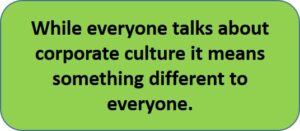 While everyone talks about corporate culture it means something different to everyone
While everyone talks about corporate culture it means something different to everyone- Very few leaders have ever bothered to look up the definition because they believe that they already know it
- It is the primary and fundamental driving force of every team, organization, company, family or group of folks with a common vision, direction or goal.
If you’ve attended one of our live or virtual Achieving Excellent Culture Workshops you know that if you Google the definition of Corporate Culture, you’re going to get something like:
- “The shared values, attitudes, standards, and beliefs that characterize members of an organization and define its nature.” Google: Encyclopedia of Business Terms
- “The beliefs and ideas that a company has and the way in which they affect how it does business and how its employees behave.” Google: Cambridge English Dictionary
Bottom Line: Corporate Culture is “The beliefs that govern how people behave at work or on any commonly focused group or team.”
If someone believes “My boss is a jerk,” they are going to behave totally differently at work than someone who believes the opposite. A teenager who believes “My parents don’t understand me” is going to behave totally differently than one who believes the opposite and so forth.

So, what did the folks at Costco believe that the folks at J.C. Penny, J. Crew, Nieman Marcus and Nordstrom did not? What were the critical differences in their beliefs relative to the pandemic situation that made all the difference? What did they believe long before the pandemic hit that made all the difference?
What do early adapters believe that laggards and sluggards do not believe? What do laggards and sluggards believe that champions do not? While you can probably think of lots of examples, the critical factors are the 10 Key Core Beliefs that differentiate the winners from the losers. Those that differentiate between the fast and the slow, the mobile and the stuck, the virtual and the static, the real teams, and the teams in name only. Before we start drilling down on what those specific pandemic related beliefs are, let’s focus the 10 Key Core Areas as a good starting point.
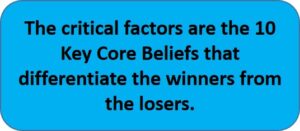
More than four decades of research and experience working with many of the world’s best corporate cultures has been a tremendous education. What our research and experience have taught us that is most valuable as it relates to today’s global pandemic situation are these top ten core beliefs.
What do your people believe about:
- Change and Innovation?
- Accountability?
- Their Own Importance to the Team?
- Handling Problems and Emergencies?
- Efficiency and Results?
- Leadership & Leadership Development?
- Their Potential and Their Goals?
- Teamwork?
- Competition?
- Problem Solving?
THE POWER OF LIMITING AND LIBERATING BELIEFS
 If you’ve attended one of our live or virtual Achieving Excellent Culture Workshops, you know about the power of limiting and liberating beliefs. If you haven’t had the opportunity to participate yet, read LEADING THE LIGHT IN THIS DARKNESS and take advantage of the complimentary, no strings attached free daily email podcast offer so you and your team can learn.
If you’ve attended one of our live or virtual Achieving Excellent Culture Workshops, you know about the power of limiting and liberating beliefs. If you haven’t had the opportunity to participate yet, read LEADING THE LIGHT IN THIS DARKNESS and take advantage of the complimentary, no strings attached free daily email podcast offer so you and your team can learn.
The amazing thing about our beliefs and our team’s beliefs is that whatever we believe controls not only our awareness (what we see, hear or perceive through our senses), but our internal motivation, our creativity or lack of it and what percentage of our God-given talent or abilities we use or don’t use.
For example, when you believe you lost your keys and cannot find them, you could be looking everywhere for them, scrambling to find them so that you’re not late for your appointment. Exerting maximum effort, calling in the entire family to help you and doing your best doesn’t seem to help when you believe that you lost them, and the pressure is on. Yet, when your five-year-old (who doesn’t share your “I lost my keys” belief) shows up on the scene and whispers in your ear “What’s that on the kitchen counter daddy?” everything changes.
Or, when you are late for dinner and realize that you forgot to stop at Costco on the way home for that special missing ingredient that will make all the difference in tonight’s special dinner. Of course, they are just about to close their doors and there is never a parking place because the place is packed. Why? Because you believe you can never find one when the pressure is on? Not for me. I’ve learned to believe I deserve a parking place that’s close to the front door and that it’s going to be easy for me to find one.
As a result, I see the flashing taillights of the folks who are just about to pull out and give me their place. I see the exhaust fumes coming from the vehicles that are just about to leave. I see the people with their shopping carts with only one or two items in them are heading to their cars to leave. And then if I still don’t get one fast, I pull up and offer to return their shopping cart for them as soon as they depart.
The best part about this elaborative Costco parking place strategy is that I don’t even have to think about it, let alone plan it. I just believe that I’m supposed to find a parking place close to the front door and that it’s going to be easy for me to do so and relax as I watch everything else fall into place easily.
Ever wonder why when you watch or read too much news on the pandemic you start to feel hopeless, depressed or de-motivated? How about when catch yourself thinking and talking to others about “When will we ever get back to normal” or “when is this finally going to end.” your internal drive, energy and creativity seem to dissipate.
What do you believe? What does your team believe? Most importantly, what do you both believe about this pandemic’s effect on your future? Your productivity? Your success? Your ability to work from home and be productive? Your ability to respond quickly and effectively to the next unexpected change that is about to hit you? About each of the 10 Key Core Beliefs that differentiate the winners from the losers noted above?
WHAT DOES YOUR TEAM REALLY BELIEVE THAT’S DRIVING HOW THEY RESPOND TO THE PANDEMIC?
While the 10 Key Core Beliefs are critically important to any team or organization during any season, they take on a whole new level of significance, power and critical importance when massive continuous change, intense fear and a future of unknown variables come onto the scene. They become the huge driving forces that differentiate between being stuck and unstuck, mobility and stagnation, speed and lethargy, winning and losing as well as existence and extinction.
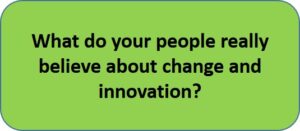 What do your people really believe about change and innovation? Do they hate change? Do they avoid it as much as possible or do they love the adventure of creating and responding to something new? Or, perhaps something in between?
What do your people really believe about change and innovation? Do they hate change? Do they avoid it as much as possible or do they love the adventure of creating and responding to something new? Or, perhaps something in between?
What do they believe about accountability? Is it heavy handed micro-managing bosses putting spy cams in their home office to hold them accountable to get their eight hours in or team members raising their hands and volunteering to be held accountable for their part of the puzzle by fellow teammates? Or, does accountability only work when there is a crystal-clear line drawn between every specific action and the corresponding consequence associated with it or something in between? What do you want it to be?
What do they believe about their own importance to the team? Do they just keep their heads down and do their jobs? Or do they truly give their best every day because they believe they are a valuable component of your team’s success?
How much time do leaders and managers spend reacting to problems and emergencies? Are there very few real emergencies because your people are so proactive about addressing and solving potential issues before they become emergencies? Or, are there are too many ‘fire drills’ that have a negative impact on their success?
What do they believe about efficiency and results? That your business moves too fast for any real monitoring activity? Or, that management by walking around, frequent ad hoc meetings and emails are what gets stuff done? Does it?
How about leadership and leadership development? We have lots of managers but I’m not sure we have many real leaders. Or something else?
 Most importantly, what do they believe about their potential and their goals? Do they believe that they are constantly overwhelmed and doing all they can to get by? Or, that they basically know how to do their jobs but resist goal setting, cross training or learning how to do more? Or better yet, do they believe that they have untapped potential to be and do more, have clearly defined and written job goals and are constantly embracing tools and processes to learn and improve?
Most importantly, what do they believe about their potential and their goals? Do they believe that they are constantly overwhelmed and doing all they can to get by? Or, that they basically know how to do their jobs but resist goal setting, cross training or learning how to do more? Or better yet, do they believe that they have untapped potential to be and do more, have clearly defined and written job goals and are constantly embracing tools and processes to learn and improve?
What do they believe about your competition? About teamwork? “It’s a very competitive environment around here. Individuals focus on individual results and performance and don’t have much time for interaction with others.” Or “Our Employees actively support each other across the organization. They care about each other as fellow human beings and frequently reach out to help one another even when there’s no compensation attached.” Or could it be that they believe that “We are under-resourced and over-matched so let’s get whatever we can from whoever we can.”
Finally, what do they believe about problem solving? Do they believe that mistakes and problems frequently go undetected until discovered later in the cycle? Or, that our people see problems and mistakes as opportunities to improve? Or that they are eager to find and discuss them and embrace the process to correct, solve and resolve them.
You should have the idea by now. The difference between the thrivers and the sinkers was grounded in these 10 key core beliefs held by every team member about their own individual and collective opinions in each of these 10 areas. What your people truly believe about each of these 10 areas determines how they are responding to the crisis. It determines how they respond to their day-to-day workloads. How they respond to working at home versus working at the office. How they respond to rapid, in your face, aggressive never-ending change. Do you know what they honestly believe about all these critical issues in this challenging season?
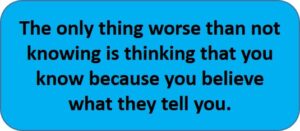 The only thing worse than not knowing, is thinking that you know because you believe what they tell you or what you observe but you have no real idea what they tell each other when you’re not around. Or, what they post on their social media or text their friends about you, your work environment, the job at hand or all of the other 10 factors that will determine how well you and your firm responds during this season of the virus.
The only thing worse than not knowing, is thinking that you know because you believe what they tell you or what you observe but you have no real idea what they tell each other when you’re not around. Or, what they post on their social media or text their friends about you, your work environment, the job at hand or all of the other 10 factors that will determine how well you and your firm responds during this season of the virus.
Addressing how to build the 10 Key Core Beliefs and Corporate Culture that will optimize your success during these challenging times, is a lengthy subject for another time. For now, we at Excellent Cultures, want to do our part to help you discover what is really going on below the surface in your corporate culture. We want you to be able to be able to discover, assess and measure where these 10 key core beliefs are in your own organization / team with a complimentary, anonymous, no strings attached contribution to the success of your team.
Just our gift to you as our way to help you build the “New Reality” that you most desire for your team during this challenging season.
PASS IT ON
I am certainly no expert, just an intentional observer who cares about you, your business, your team, your family and most of all, your future. I might be wrong or even worse than that, “Controversial.”
 Yet, there is one thing I know is ABSOLUTELY CERTAIN: “IN TIMES LIKE THESE, YOU CAN EITHER STAND STILL AND CURSE THE DARKNESS OR YOU CAN LIGHT A CANDLE AND MOVE FORWARD.” Even better, “YOU CAN LEAD THE LIGHT IN THIS NEW REALITY.” Imagine what a difference we can make if all of us intentionally light just one candle for someone else every single day!
Yet, there is one thing I know is ABSOLUTELY CERTAIN: “IN TIMES LIKE THESE, YOU CAN EITHER STAND STILL AND CURSE THE DARKNESS OR YOU CAN LIGHT A CANDLE AND MOVE FORWARD.” Even better, “YOU CAN LEAD THE LIGHT IN THIS NEW REALITY.” Imagine what a difference we can make if all of us intentionally light just one candle for someone else every single day!
STAY SAFE, BE WELL, DREAM BIG and PASS IT ON!
#AmericaWorksTogether #AmericaUnited


